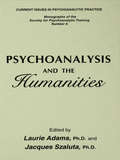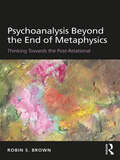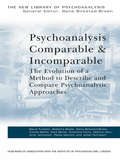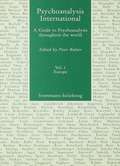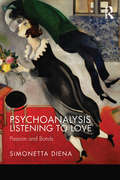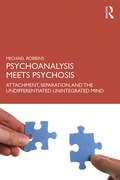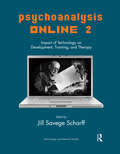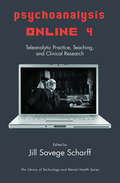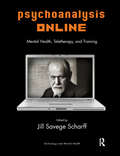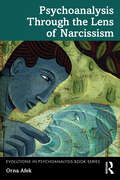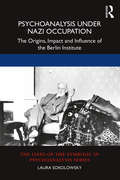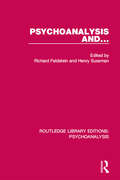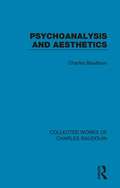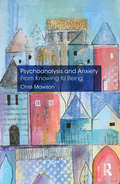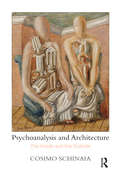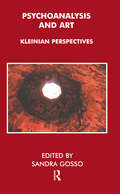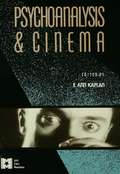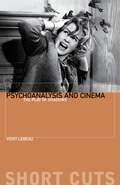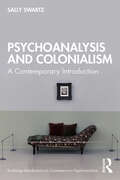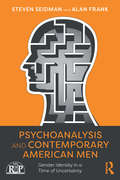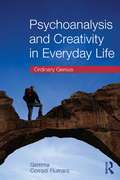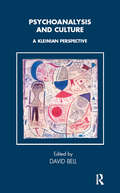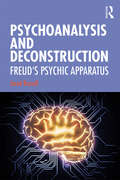- Table View
- List View
Psychoanalysis And The Humanities
by Laurie Adams Jacques SzalutaFirst published in 1996. Routledge is an imprint of Taylor & Francis, an informa company.
Psychoanalysis Beyond the End of Metaphysics: Thinking Towards the Post-Relational
by Robin S. BrownWinner of the Theoretical Category of the American Board & Academy of Psychoanalysis Book Prize for best books published in 2016 Psychoanalysis Beyond the End of Metaphysics offers a new paradigm approach which advocates reengaging the importance of metaphysics in psychoanalytic theorizing. The emergence of the relational trend has witnessed a revitalizing influx of new ideas, reflecting a fundamental commitment to the principle of dialogue. However, the transition towards a more pluralistic discourse remains a work in progress, and those schools of thought not directly associated with the relational shift continue to play only a marginal role. In this book, Robin S. Brown argues that for contemporary psychoanalysis to more adequately reflect a clinical ethos of pluralism, the field must examine the extent to which a theoretical commitment to the notion of relationship can grow restrictive. Suggesting that in the very effort to negotiate theoretical biases, psychoanalytic practice may occlude a more adequate recognition of its own evolving assumptions, Brown proposes that the profession’s advance requires a return to first principles. Arguing for the fundamental role played by faith in supporting the emergence of consciousness, this work situates itself at the crossroads of relational, Jungian, and transpersonal approaches to the psyche. Psychoanalysis Beyond the End of Metaphysics will be of significant interest to all psychodynamically oriented clinicians, alongside scholars of depth psychology and the philosophy of mind. It will also be helpful to advanced and postgraduate students of psychoanalysis seeking to orient themselves in the field at present.
Psychoanalysis Comparable and Incomparable: The Evolution of a Method to Describe and Compare Psychoanalytic Approaches (The New Library of Psychoanalysis)
by David TuckettHow do we know when what is happening between two people should be called psychoanalysis? What is a psychoanalytic process and how do we know when one is taking place? Psychoanalysis Comparable and Incomparable describes the rationale and ongoing development of a six year programme of highly original meetings conducted by the European Psychoanalytic Federation Working Party on Comparative Clinical Methods. The project comprises over seventy cases discussed by more than five hundred experienced psychoanalysts over the course of sixty workshops. Authored by a group of leading European psychoanalysts, this book explores ways for psychoanalysts using different approaches to learn from each other when they present their work to fellow psychoanalysts, and provides tools for the individual practitioner to examine and improve his or her own approach. As described in detail in its pages, sticking to the task led to some surprising experiences, raising fundamental questions about the way clinical discussion and supervision are conducted in psychoanalysis. Well known by many in the psychoanalytic community and the object of much interest and debate, this project is described by those who have had the closest contact with it and will satisfy a widely held curiosity in psychoanalysts and psychotherapists throughout the world. David Tuckett is winner of the 2007 Sigourney Award.
Psychoanalysis International, V.1: A Guide to Psychoanalysis Throughout the World (Psychoanalysis International Ser. #2)
by Peter KutterIt is well known that the cradle of psychoanalysis was in Vienna, the scene of Sigmund Freud's activities at the beginning of the century. But how and when did psychoanalysis reach the other countries of Europe? What development did it undergo there? How did the different mentalities, political and cultural backgrounds as well as the personal particularities of its respective advocates affect psychoanalysis? What was its position in the past and what is its position today? These and other questions on the varied development and the present situation of psychoanalysis in the countries of eastern and western Europe are investigated by renowned psychoanalysts drawing on the experience and knowledge acquired in their own work. The result is a new conpendium on psychoanalysis in Europe containing all up-to-date information. Informative and instructive, at times as exciting as a detective story, Psychoanalysis International will possibly be of interest even to non-analysts.
Psychoanalysis Listening to Love: Passion and Bonds
by Simonetta DienaThis book is about love, about how we fall in love and why we fall in love, and about how much we suffer if unable to love or be loved. The need to love and be loved can be read as the prototype of every human need and every relationship between human beings. To be loved is wishing to be seen, known, recognised for what we are in our deepest and most hidden inner self, in our wildest desires to live and be free. It is a need for knowledge, gratefulness and recognition. Literature, cinema and our very experience of life tell us about it. By listening to love, can psychoanalysis add anything further and new to what has already been said by culture, art and by our life experiences? In psychoanalysis, the events of love can be understood by going back to the most primitive forms of human relationships, that is, to the earliest childhood experiences.
Psychoanalysis Meets Psychosis: Attachment, Separation, and the Undifferentiated Unintegrated Mind
by Michael RobbinsPsychoanalysis Meets Psychosis proposes a major revision of the psychoanalytic theory of the most severe mental illnesses including schizophrenia. Freud believed that psychosis is the consequence of a biologically determined inability to attain and sustain a normal or neurotic mental organization. Michael Robbins proposes instead that psychosis is the outcome of a different developmental pathway. Conscious mind functions in two qualitatively different ways, primordial conscious mentation and reflective representational thought, and psychosis is the result of persistence of a primordial mental process, which is adaptive in infancy, in later situations in which it is neither appropriate nor adaptive. In Part I Robbins describes how the medical model of psychosis underlies the current approach of both psychiatry and psychoanalysis, despite the fact that neuroscience has failed to confirm the model’s basic organic assumption. In Part II Robbins examines two of Freud’s models of psychosis that are based on the assumption of a constitutional inability to develop a normal or neurotic mind. The theories of succeeding generations of analysts have for the most part reiterated the biases of Freud’s two models, so that psychoanalysis considers the psychoses beyond its scope. In Part III Robbins proposes that the psychoses are the result of disturbances in the attachment-separation phase of development, leading to maladaptive persistence of a primordial form of mental activity related to Freud’s primary process. Finally, in Part IV Robbins describes a psychoanalytic approach to treatment based on his model. The book is richly illustrated with material from Robbins’ clinical practice. Psychoanalysis Meets Psychosis has the potential to undo centuries of alienation between society and psychotic persons. The book offers an understanding of severe mental illness that will be novel and inspiring not only to psychoanalysts but to all mental health professionals.
Psychoanalysis Online 2: Impact of Technology on Development, Training, and Therapy (The Library of Technology and Mental Health)
by Jill Savege ScharffThis book addresses the impact of technology and the Internet in four parts: on development, on the training of therapists, on professional ethics, and on the provision of psychotherapy and psychoanalysis. It brings an immersion in the issues of clinical work with patients in analysis and therapy.
Psychoanalysis Online 4: Teleanalytic Practice, Teaching, and Clinical Research (The\library Of Technology And Mental Health Ser.)
by Jill Savege ScharffPsychoanalysis Online 4: Teleanalytic Practice, Teaching, and Clinical Research brings a systematic, qualitative research perspective to the question of the effectiveness of teletherapy, teleanalysis, and teleteaching. It suggests that, contrary to some traditional arguments, effective treatment, teaching, and supervision can take place remotely; that affect and imagination are more important than physical presence. Providing theories of therapeutic action as well as philosophical reflections, the book features examples of online clinical cases, including crisis interventions by email, and aims to stimulate openness to innovation, responsible process and review. Each contributor presents their clinical qualitative research and survey study findings. The Bernardi Three-Level Model, developed for assessing therapeutic change in the traditional analytic setting, is applied to the study of teleanalysis with different patients. It is found that, in videoconference or even in email communication, the sense of closeness in the therapeutic encounter does not depend on physical proximity but on integrity and commitment. The book concludes with research findings on the effectiveness of videoconference compared to in-the-classroom settings for teaching psychodynamics, supervising psychotherapy, and conducting psychotherapy with Chinese students. It will be of great interest to a variety of professionals and researchers who practise remotely, with particular relevance for those situated in the fields of psychoanalysis and psychotherapy.
Psychoanalysis Online: Mental Health, Teletherapy, and Training (The\library Of Technology And Mental Health Ser.)
by Jill Savege ScharffThis book is about teleanalysis, an exploration of teletherapy—psychotherapy by telephone, Voice over Internet Protocol (VoIP), or videoteleconference (VTC). It discusses advantages and disadvantages of psychotherapy and psychoanalysis conducted over the phone and internet.
Psychoanalysis Through the Lens of Narcissism (Evolutions in Psychoanalysis Book Series)
by Orna AfekThis critical historical review of psychoanalytic theory and practice reflects on the place of psychoanalysis in contemporary Western culture in light of its preoccupation with the self and associated failure to emphasize the role of close interpersonal relationships as central to the human psyche.The elusive presence of the separate other in psychoanalytic theory is discussed vis-à-vis the life stories of Freud, Winnicott, and Kohut. The underlying narcissistic bias in the theories of these three pioneers of psychoanalysis – classical Freudian drive theory, Winnicott’s theory of the parent-infant relationship, and Kohut's theory of self-psychology – is traced back to their narcissistic personality traits, which impacted their views and perceptions and obscured the fundamental centrality of interpersonal relationships per se in the inner world of the individual, with far-reaching implications for psychoanalytic thought and practice.With fresh insights on the subjectivity of personality theories, the core features of the narcissistic personality, and the implications of the narcissistic position for theory and clinical practice, this book will interest psychotherapists, psychoanalysts, and other professionals in the field, specifically those interested in personality diagnosis, narcissism, attachment theory, and psychotherapeutic approaches and psychoanalytic theories in general.
Psychoanalysis Under Nazi Occupation: The Origins, Impact and Influence of the Berlin Institute
by Laura SokolowskyLaura Sokolowsky’s survey of psychoanalysis under Weimar and Nazism explores how the paradigm of a ‘psychoanalysis for all’ became untenable as the Nazis rose to power. Mainly discussing the evolution of the Berlin Institute during the period between Freud’s creation of free psychoanalytic centres after the founding of the Weimar Republic and the Nazi seizure of power in 1933, the book explores the ideal of making psychoanalysis available to the population of a shattered country after World War I, and charts how the Institute later came under Nazi control following the segregation and dismissal of Jewish colleagues in the late 1930s. The book shows how Freudian standards resisted the medicalisation of psychoanalysis for purposes of adaptation and normalisation, but also follows Freud’s distinction between sacrifice (where you know what you have given up) and concession (an abandonment of position through compromise) to demonstrate how German psychoanalysts put themselves at the service of the fascist master, in the hope of obtaining official recognition and material rewards. Discussing the relations of psychoanalysis with politics and ethics, as well as the origin of the Lacanian movement as a response to the institutionalisation of psychoanalysis during the Nazi occupation, this book is fascinating reading for scholars and practitioners of psychoanalysis working today.
Psychoanalysis and ...: The Sublime And The Grandiose In Literature, Psychopathology, And Culture (Routledge Library Editions: Psychoanalysis)
by Henry Sussman Richard FeldsteinOriginally published in 1990, Psychoanalysis and… brings together essays by critics whose work demonstrates the lively interpenetration of psychoanalysis and other disciplines. Andrew Ross investigates psychoanalysis and Marxist thought; Joel Fineman reads the "sound of O" in Othello; Jane Gallop asks "Why does Freud giggle when the women leave the room?"; and Ellie Ragland-Sullivan examines Lacan’s seminars on James Joyce. This stimulating collection of work should still be required reading, especially for students of literature. But Psychoanalysis and… demonstrates that psychoanalysis – and theoretical criticism, and feminism, and Lacanian theory, and semiotics, and Marxism, and deconstruction, and literary criticism – was, at the time, a rich and expanding terrain.
Psychoanalysis and Aesthetics (Collected Works of Charles Baudouin)
by Charles BaudouinOriginally published in 1924, this title is substantially a continuation of Baudouin’s earlier work Studies in Psychoanalysis, being an application of psychoanalysis to the theory of aesthetics, as illustrated by a detailed study of the works of the Belgian poet Emile Verhaeren. The ‘interpretation’ Freud has supplied for dreams Baudouin attempts – and archives – for the imagery of the artistic creator. The work is in part based upon private documents supplied to the author by Madame Verhaeren, an autograph letter, and a previously unpublished poem.
Psychoanalysis and Anxiety: From Knowing to Being
by Chris MawsonPsychoanalysis and Anxiety: From Knowing to Being combines psychoanalytic, existential and dramaturgical perspectives on the study of anxiety. The book explores the implications for psychoanalysis of including a consideration of the being of the patient, and of the analyst. The central principle throughout is that the psychoanalytic and the existential belong together since it is the irreducible fact of anxiety that unifies them. It is in relation to anxiety that we are helped by other human beings to bear what is, and what we are. Divided into four sections, the book begins with the distinction made in antiquity between anxiety and fear, before discussing its treatment by philosophers such as Heidegger, who regarded anxiety as the mood most disclosive of our being, and Kierkegaard, who distinguished between fear and angst. The book then explores how anxiety has been understood by major psychoanalytic theorists, including Freud, Klein, Winnicott and Bion, before a third part discusses how key principles of drama relate to therapeutic practice and theory, including a re-evaluation of the concept of catharsis, as well as Brecht’s concept of making strange the familiar. The pursuit of insightful knowledge in psychoanalysis is reconsidered in the book’s concluding section, with a shift of emphasis from psychoanalytic interpretations as statements of knowing to interpretive activity as a continuous process of becoming informed. This insightful and wide-ranging volume will fascinate practising psychoanalysts and psychotherapists, anyone working in mental health, as well as scholars of philosophy and theatre.
Psychoanalysis and Architecture: The Inside and the Outside
by Cosimo SchinaiaThis book explores how psychoanalysis and architecture can enhance and increase the chances of mental 'containment', while also fostering exchange between inside and outside. The way in which psychoanalysts take care of mental suffering, and the way in which architects and city planners assess the environment, are grounded in a shared concern with the notion of 'dwelling'. It is a matter of fact that dwelling exists in a complex context comprised of both biological need and symbolic function. Psychoanalysis and architecture can work together in both thinking about and designing not only our homes but also the analyst's consulting rooms and, more generally, our therapy places. However, this is possible only if they renounce the current limited and restrictive model of this interaction, and propose one more that is more in harmony with the questions and situations that clients themselves pose.
Psychoanalysis and Art: Kleinian Perspectives
by Donald MeltzerThis essential edition brings together a collection of classic papers from key figures in Kleinian and post-Kleinian thought that explore the relationship between psychoanalysis and art.Sandra Gosso begins with a comprehensive and fascinating guide to the history of this relationship which began with Freud and was developed further by Melanie Klein at a time when most analysts were moving away from links with art. Melanie Klein's pivotal paper, "Infantile Anxiety Situations Reflected in a Work of Art and in the Creative Impulse", follows the Introduction. The other papers featured are mainly from British analysts who expanded on Melanie Klein's ideas, inspired by the influence of the creative Bloomsbury and Imago Groups.
Psychoanalysis and Buddhism
by Jeremy D. Safran"What a wonderful book! Jeremy Safran has assembled an absolutely stellar group of writers and has himself contributed an illuminating introduction. The essays are riveting and the book is the rare edited collection with real thematic unity. If you think you might have an interest in the intersection of psychoanalysis and Buddhism, this is the place to start. If you already know you're interested, once you look at the table of contents you'll find (at least I did) that you want to let Psychoanalysis and Buddhism displace whatever you were going to read next."--Donnel B. Stern, PhD, author of Unformulated Experience and editor of Contemporary Psychoanalysis
Psychoanalysis and Cinema (AFI Film Readers)
by E. Ann KaplanThese fifteen carefully chosen essays by well-known scholars demonstrate the vitality and variety of psychoanalytic film criticism, as well as the crucial role feminist theory has played in its development. Among the films discussed are Duel in the Sun, The Best Years of Our Lives, Three Faces of Eve, Tender is the Night, Pandora's Box, Secrets of the Soul, and the works of Jacques Tourneur (director of The Cat People and other features).
Psychoanalysis and Cinema: The Play of Shadows (Short Cuts)
by Vicky LebeauLebeau examines the long and uneven history of developments in modern art, science, and technology that brought pychoanalysis and the cinema together towards the end of the nineteenth century. She explores the subsequent encounters between the two: the seductions of psychoanalysis and cinema as converging, though distinct, ways of talking about dream and desire, image and illusion, shock, and sexuality. Beginning with Freud's encounter with the spectacle of hysteria on display in fin-de-siècle Paris, this study offers a detailed reading of the texts and concepts which generated the field of psychoanalytic film theory.
Psychoanalysis and Colonialism: A Contemporary Introduction (Routledge Introductions to Contemporary Psychoanalysis)
by Sally SwartzWithin this important and insightful book, Sally Swartz introduces readers to early entanglements of psychoanalytic theory with colonialism and how it has led to significant and long-lasting implications for psychoanalysis. Psychoanalysis and Colonialism is unique in drawing together a wide array of sources and a span of history from the beginnings of psychoanalysis to current theory and practice. The book explores ways in which Freudian theory incorporated the idea of the primitive into the centre of mapping the untamed territories of the unconscious, via notions of taming instinctual excess, civilizing the primitive and conquering and bringing order to wildness. The text describes the influences of colonialism on the thinking of Freud and Jung and goes on to describe anti-colonial voices, including Césaire and Mannoni, Memmi and Fanon, and their contribution to psychoanalytic theory. It concludes with thoughts on the challenges of decolonizing psychoanalysis. This book is an accessible account of the links between colonialism and psychoanalysis and is suitable for general readers with an interest in the topic, as well as all psychoanalytic practitioners grappling with the ways in which issues of race, class, gender and sexuality affect their ways of working and writing.
Psychoanalysis and Contemporary American Men: Gender Identity in a Time of Uncertainty (Relational Perspectives Book Series)
by Steven Seidman Alan FrankDebate over gender and especially the lives of men is currently at a fever pitch, particularly in the United States. New perspectives that capture the complexity of men and a rapidly changing gender landscape are therefore critical today. Psychoanalysis and Contemporary American Men challenges narrow stereotyped views of men by arguing that men are as complex and layered as women. In the light of the recent #MeToo movement, stereotypes of men are being recycled. While aligned with the spirit of this movement, the authors worry that negative stereotypes of men are being perpetrated at the very time that men are renegotiating their gender experience. The authors present a critical non-heteronormative perspective addressing current gender transformations. Although the lives of men are changing, the stories that dominate the public sphere often represent them as narrowly phallic—controlling, detached, sexist, and homophobic. Seidman and Frank offer a counter point: men are also "guardians" driven to be useful and to do good, to live valued and purposeful lives. They argue that men are not only driven by a will to power but by an ethically-minded, relationally-oriented sense of responsibility to care for others, whether partners, children, or fellow citizens. Drawing on historical, sociological, and psychoanalytic work, this book provides a nuanced, multidimensional construct of American men today. Psychoanalysis and Contemporary American Men will be of interest to psychoanalysts and psychotherapists as well as scholars and students of gender and queer studies.
Psychoanalysis and Covidian Life: Common Distress, Individual Experience
by Howard B. Levine and Ana de StaalShowcasing a diverse range of contributions from psychoanalysts of many different countries and theoretical orientations, Psychoanalysis and Covidian Life, a collective work edited by Howard B. Levine and Ana de Staal, offers readers the opportunity to explore and reflect upon the ways in which the Covid-19 pandemic has begun to influence analytical practice. From the changes imposed on the framework (online sessions) to the impact of the trauma of isolation and the disruption of our social anchoring (required by confinement and health protection gestures), to the challenge presented to the 'ordinary' denial of mortality, this book explores the lessons of what the pandemic can teach us about how to understand and treat collective distress individually and puts psychoanalytical tools to the test of the profound psychosocial upheavals that the twenty-first century may hold in store. This book will be of interest to practising and trainee clinicians and anyone with an interest in the all-consuming effects of a global pandemic. Contributions from Christopher Bollas, Patricia Cardoso de Mello, Bernard Chervet, Joshua Durban, Antonino Ferro, Serge Frisch, Steven Jaron, Daniel Kupermann, Howard Levine, Francois Levy, Riccardo Lombardi, Elias & Alberto Rocha Barros, Michael Rustin, Ana de Staal, and Jean-Jacques Tyszler.
Psychoanalysis and Creativity in Everyday Life: Ordinary Genius
by Gemma Corradi FiumaraPsychoanalysis and Creativity in Everyday Life: Ordinary Genius is an attempt to create a psychoanalytic space for the quest and questions of our everyday creativity. Official creativity is normally applauded to the point of obscuring all other types of creativity, with detrimental consequences for our psychic life. However, as Gemma Corradi Fiumara demonstrates, the creative force of ordinary subjects can be as vigorous as that of our acclaimed, official accomplishments. Corradi Fiumara focuses on the unsung creativity which emerges from relationships and the world at large. She explores how understanding the operation of creative impulses in an everyday setting can crucially inform psychoanalytic clinical work. There are three main themes: Donald Winnicott’s Psychoanalytic Will Melanie Klein and the Other Side of Genius Genius: Ordinary and Extraordinary. Psychoanalysis and Creativity in Everyday Life advocates an inclusionary view of human genius, and demonstrates that creativity and genius can be manifested in everyday life with the ordinary as its focus of attention. It will be key reading for psychoanalysts, psychoanalytic psychotherapists, philosophers and scholars in social studies.
Psychoanalysis and Culture: A Kleinian Perspective (Tavistock Clinic Series)
by David BellThis book provides an extensive introduction and theoretical background to the field, situating psychoanalysis itself in contemporary culture. It shows the relevance of psychoanalysis beyond the consulting room to the understanding of human affairs in general.
Psychoanalysis and Deconstruction: Freud's Psychic Apparatus
by Jared RussellPsychoanalysis and Deconstruction: Freud's Psychic Apparatus demonstrates the relevance of deconstructive thinking for the clinical practice of psychoanalysis. Arguing that deconstruction has been misrepresented as a form of literary theory or a philosophy of language, the book puts Derrida, Heidegger and others working in the tradition of deconstruction into dialogue with debates in the contemporary psychoanalytic field. Attempting to retrieve what was radical in Freud’s portrayal of the mind as a machine, Jared Russell stresses the importance of psychoanalysis for an understanding of the relationship between the human and its current hyper-technological environment. Interventions into contemporary debates address psychoanalytic concepts such as the nature of the clinical frame, the intersubjective dialogue, unconscious communication and the experience of time. Russell argues that deconstruction, and in particular Derrida’s work, can anticipate and help clarify ongoing developments at the cutting edge of psychoanalysis today. Psychoanalysis and Deconstruction: Freud's Psychic Apparatus will appeal not only to a philosophically informed audience but also to clinicians attempting to secure a place for psychoanalytic practice at the beginning of the twenty-first century.
